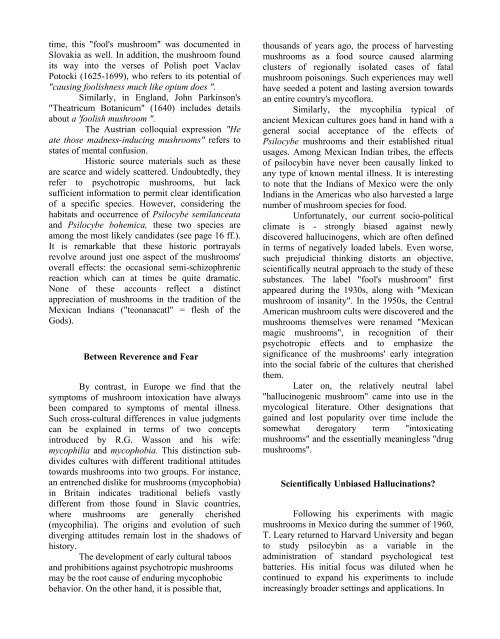Jochen Gartz - Magic Mushrooms Around the ... - preterhuman.net
Jochen Gartz - Magic Mushrooms Around the ... - preterhuman.net
Jochen Gartz - Magic Mushrooms Around the ... - preterhuman.net
Create successful ePaper yourself
Turn your PDF publications into a flip-book with our unique Google optimized e-Paper software.
time, this "fool's mushroom" was documented in<br />
Slovakia as well. In addition, <strong>the</strong> mushroom found<br />
its way into <strong>the</strong> verses of Polish poet Vaclav<br />
Potocki (1625-1699), who refers to its potential of<br />
"causing foolishness much like opium does ".<br />
Similarly, in England, John Parkinson's<br />
"Theatricum Botanicum" (1640) includes details<br />
about a 'foolish mushroom ".<br />
The Austrian colloquial expression "He<br />
ate those madness-inducing mushrooms" refers to<br />
states of mental confusion.<br />
Historic source materials such as <strong>the</strong>se<br />
are scarce and widely scattered. Undoubtedly, <strong>the</strong>y<br />
refer to psychotropic mushrooms, but lack<br />
sufficient information to permit clear identification<br />
of a specific species. However, considering <strong>the</strong><br />
habitats and occurrence of Psilocybe semilanceata<br />
and Psilocybe bohemica, <strong>the</strong>se two species are<br />
among <strong>the</strong> most likely candidates (see page 16 ff.).<br />
It is remarkable that <strong>the</strong>se historic portrayals<br />
revolve around just one aspect of <strong>the</strong> mushrooms'<br />
overall effects: <strong>the</strong> occasional semi-schizophrenic<br />
reaction which can at times be quite dramatic.<br />
None of <strong>the</strong>se accounts reflect a distinct<br />
appreciation of mushrooms in <strong>the</strong> tradition of <strong>the</strong><br />
Mexican Indians ("teonanacatl" = flesh of <strong>the</strong><br />
Gods).<br />
Between Reverence and Fear<br />
By contrast, in Europe we find that <strong>the</strong><br />
symptoms of mushroom intoxication have always<br />
been compared to symptoms of mental illness.<br />
Such cross-cultural differences in value judgments<br />
can be explained in terms of two concepts<br />
introduced by R.G. Wasson and his wife:<br />
mycophilia and mycophobia. This distinction subdivides<br />
cultures with different traditional attitudes<br />
towards mushrooms into two groups. For instance,<br />
an entrenched dislike for mushrooms (mycophobia)<br />
in Britain indicates traditional beliefs vastly<br />
different from those found in Slavic countries,<br />
where mushrooms are generally cherished<br />
(mycophilia). The origins and evolution of such<br />
diverging attitudes remain lost in <strong>the</strong> shadows of<br />
history.<br />
The development of early cultural taboos<br />
and prohibitions against psychotropic mushrooms<br />
may be <strong>the</strong> root cause of enduring mycophobic<br />
behavior. On <strong>the</strong> o<strong>the</strong>r hand, it is possible that,<br />
thousands of years ago, <strong>the</strong> process of harvesting<br />
mushrooms as a food source caused alarming<br />
clusters of regionally isolated cases of fatal<br />
mushroom poisonings. Such experiences may well<br />
have seeded a potent and lasting aversion towards<br />
an entire country's mycoflora.<br />
Similarly, <strong>the</strong> mycophilia typical of<br />
ancient Mexican cultures goes hand in hand with a<br />
general social acceptance of <strong>the</strong> effects of<br />
Psilocybe mushrooms and <strong>the</strong>ir established ritual<br />
usages. Among Mexican Indian tribes, <strong>the</strong> effects<br />
of psilocybin have never been causally linked to<br />
any type of known mental illness. It is interesting<br />
to note that <strong>the</strong> Indians of Mexico were <strong>the</strong> only<br />
Indians in <strong>the</strong> Americas who also harvested a large<br />
number of mushroom species for food.<br />
Unfortunately, our current socio-political<br />
climate is - strongly biased against newly<br />
discovered hallucinogens, which are often defined<br />
in terms of negatively loaded labels. Even worse,<br />
such prejudicial thinking distorts an objective,<br />
scientifically neutral approach to <strong>the</strong> study of <strong>the</strong>se<br />
substances. The label "fool's mushroom" first<br />
appeared during <strong>the</strong> 1930s, along with "Mexican<br />
mushroom of insanity". In <strong>the</strong> 1950s, <strong>the</strong> Central<br />
American mushroom cults were discovered and <strong>the</strong><br />
mushrooms <strong>the</strong>mselves were renamed "Mexican<br />
magic mushrooms", in recognition of <strong>the</strong>ir<br />
psychotropic effects and to emphasize <strong>the</strong><br />
significance of <strong>the</strong> mushrooms' early integration<br />
into <strong>the</strong> social fabric of <strong>the</strong> cultures that cherished<br />
<strong>the</strong>m.<br />
Later on, <strong>the</strong> relatively neutral label<br />
"hallucinogenic mushroom" came into use in <strong>the</strong><br />
mycological literature. O<strong>the</strong>r designations that<br />
gained and lost popularity over time include <strong>the</strong><br />
somewhat derogatory term "intoxicating<br />
mushrooms" and <strong>the</strong> essentially meaningless "drug<br />
mushrooms".<br />
Scientifically Unbiased Hallucinations<br />
Following his experiments with magic<br />
mushrooms in Mexico during <strong>the</strong> summer of 1960,<br />
T. Leary returned to Harvard University and began<br />
to study psilocybin as a variable in <strong>the</strong><br />
administration of standard psychological test<br />
batteries. His initial focus was diluted when he<br />
continued to expand his experiments to include<br />
increasingly broader settings and applications. In








![The Big Lie 9-11 and Government Complicity in Mass Murder [PDF]](https://img.yumpu.com/50957077/1/190x245/the-big-lie-9-11-and-government-complicity-in-mass-murder-pdf.jpg?quality=85)








